Support for Principles Remains Strong
Even in the face of an ever-shifting political landscape, support for the 10 Principles to Unite America remains strong.
The 10th principle, Education Is Crucial to Our Future, nudged upward to tie Equal Rights for All, Responsibilities for All as the co-most popular ideals in the most recent public opinion survey of registered voters conducted by Survey USA in January 2023. The two each drew strong agreement from 81 percent who were surveyed.
Otherwise, the strong agreement with the remainder of the principles stayed within the ranges established in the previous six surveys. The latest percentages of those who strongly agree:
- We’re better united than divided. 77%
- Even with our flaws, we have much to cherish. 66%
- Our great democracy is only as good as we make it. 69%
- Give us liberty, though not to harm others. 66%
- We are a nation of laws — that need to be equally applicable to all. 79%
- Equal rights for all; Responsibilities for all. 81%
- Government – at all levels – needs to be better at what it does. 80%
- Our military stands strong to deter, not to provoke. 66%
- New opportunities are needed in communities across the land. 62%
- Education is crucial to our future. 81%
All-In for We’re Better United
Nearly 80 percent of Americans strongly agree we’re better united than divided. Most of the remaining 20 percent somewhat agree. Many substantiate their support with comments that in one way or another call for us to act in common, be united, come together.
This amidst the gloom that division is all around us. Everything seems to be politicized, from school boards to public health officials to the U.S. Supreme Court. The nation is divided on major issues such as gun control, immigration and climate change, and we don’t have a way, or the will, to solve them. We watch discord in Washington, D.C., and experience it in our own backyard. Against this backdrop, anything to the contrary defies imagination.
Except the results of the surveys* conducted for Our Common Purpose are consistent and unwavering. Four out of every five voters strongly agree we’re better united than divided. Democrats, Republicans and independents strongly agree in near equal percentages. The agreement hasn’t wavered even during the worst of the past two years.
In an environment of inflammatory rhetoric, disinformation, contentious state legislation, all the uglies we face today, the poll results provide an encouraging message. Average Americans like you and I aspire to something different, better, more than we are getting today. The only catch being if that we want different-better-more, then we need to do different, better, more than we are doing today.
The comments gathered in the course of taking the surveys, presented here as Voices of America, add up to three objectives for we citizens that, simple as they sound, need to be stated as such. More to come in this space on each of the following. We need to:
— Raise up what unites us.
— Face down what divides us.
— Recognize that it’s on us to build unity together.
Granted it’s one thing to state objectives, quite another to make actual progress. We can’t though stand idly by without trying.
* A series of seven nationwide polls were conducted by Survey USA in a 30-month period from June 2020 to January 2023.
Backing for Three Principles Shifts Slightly
While support for the 10 Principles to Unite America remains steady and strong, the backing for three of the principles shifted slightly over the course of six nationwide public-opinion surveys conducted during the tumultuous period between June 2020 and January 2022.
The polls were conducted by Survey USA at regular intervals over the 18-month period. Each of the first five surveys were of 1,500 voters. The most recent survey polled 2,500 voters, adding up to a total sample size for the six surveys of 10,000 voters.
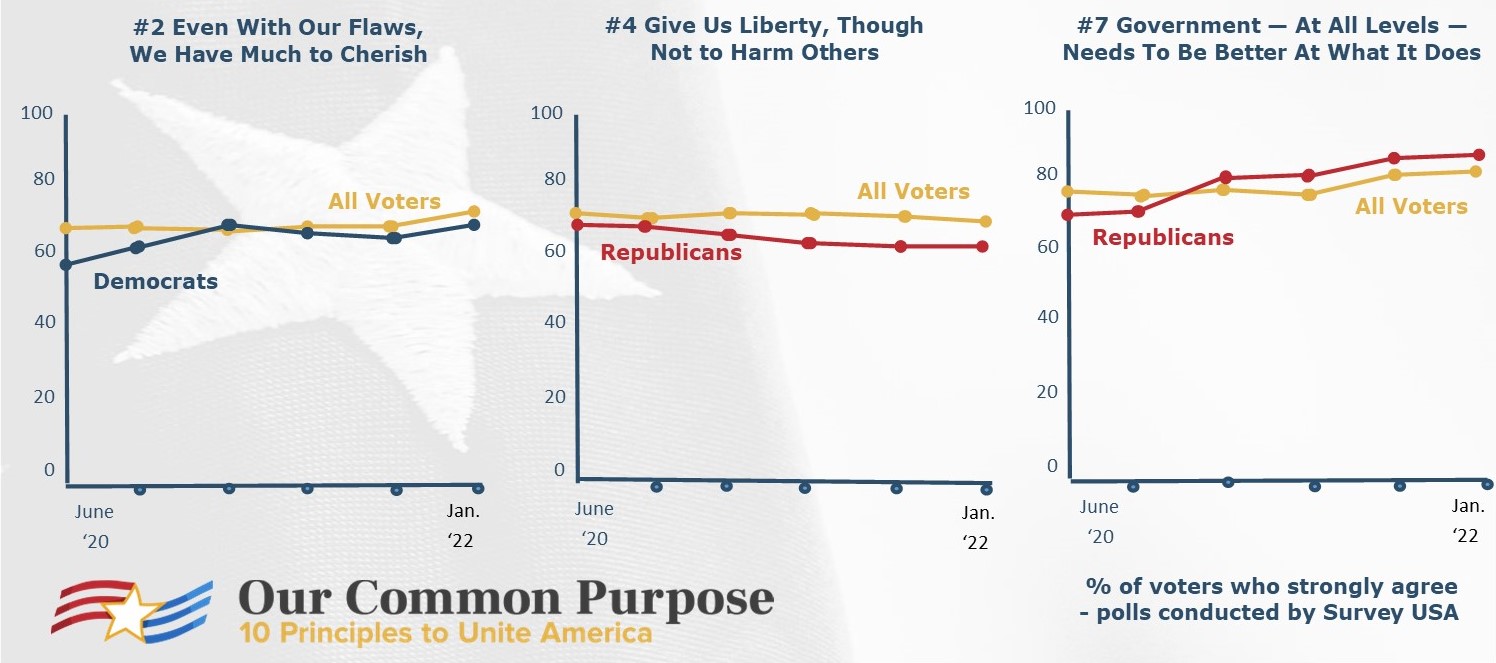
The biggest shift lifted #7 Government – At All Levels – Needs to Be Better At What It Does into a tie (with ongoing front-runner #6 Equal Rights For All, Responsibilities for All) for the highest level of strong agreement among the 10 principles.
Buoyed by increased support from Republicans that coincided with their losing the presidency, the principle enjoyed a spike of 6 percentage points from 76% to 82%. The Republican interest in better government jumped from 70% with Donald Trump in the White House to 80% when Joe Biden took over, and has risen since to 84%. Meanwhile, support for the ideal from Democrats (80%) and Independents (81%) remained strong.
The next biggest change was to #4 Give Us Liberty, Though Not to Harm Others, which dropped 5 percentage points from 69% strong agreement in June 2020 to 64% in January 2022. This change was driven by another shift in Republican sentiment. In the midst of ongoing unhappiness over mask-wearing and vaccinations, Republicans who strongly agreed with this principle slipped from 67% in June 2020 to 59% in January 2022.
The third largest change was to #2 Even With Our Flaws, We Have Much to Cherish, which gained 4 percentage points from 64% to 68% over the 18-month period. In this case the change was driven by Democrats who in June 2020 were re-examining our past in the wake of the killing of George Floyd. The percentage of Democrats who strongly agreed with this principle started off low at 58% but has since inched upward to 66%. Even with that, their support remains a bit below Republicans, whose strong agreement with this principle stands at 74%.
The levels of strong agreement with the other seven principles in the succession of polls has remained steady, varying no more than 2% over the 18-month period.
Introducing Voices of America
Voices of America, a new feature of this website, is a representative sampling of comments drawn from polling done for Our Common Purpose.
Perhaps taking their cue from the positive, non-partisan tone of the survey questions they just had been asked, most all respondents replied in similar fashion. Some responses go so far as to be giddy. One gets the impression that some of the authors yearn for what the 10 principles represent.
Good man good.
— Republican from Tinton Falls, N.J.
It is so good.
— Democrat from Dallas, Tex.
This needs to be done, now.
— Republican from Citrus Heights, Calif.
Very unlike the us versus them that we typically hear, the vast majority of respondents spoke in terms of what we need to do as a people, as a nation.
There is inspiration, hope and, yes, idealism in their comments. Many reflect pride in what we are as a nation. Even more believe we can and need to do better. While there are doubters, most found it at once uplifting and challenging that we might agree upon a set of ideals for America.
Their comments will be displayed a half-dozen at a time in the banner at the top of the home page. As the banner invites, you can offer your own comment by clicking on Join the Conversation. The comments will be replaced each month by a new set. Watch for them!
Positive Poll Results Keep Rolling In
American voters have continued to indicate strong agreement with the 10 Principles to Unite America in four surveys done over the course of the past year.
Even while the polling was conducted by Survey USA during some tense and difficult moments, a consistent percentage of Democrats, Republicans and independents said they are totally comfortable with the set of principles.
June 2020 (at the time of the George Floyd memorial services): 65%
October 2020 (just prior to the 2020 presidential election): 65%
January 2021 (shortly after the riot at the U.S. Capitol): 61%
May 2021 (100 days into the Biden presidency): 65%
In each of these surveys, most everyone else – ranging from 30% to 33% — registered as somewhat comfortable. Only 5% to 6% said they were uncomfortable or weren’t sure.
The most popular principle continues to be #6 Equal Rights for All; Responsibilities for All. In the four surveys it attracted strong agreement from 80 to 82% of voters in virtually equal numbers of Democrats, Republicans and independents. Most everyone else somewhat agreed.
It is followed quite closely by #10 Education Is Crucial to Our Future (78% to 80%); #1 We’re Better United Than Divided (77% to 79%), and #4 We Are A Nation of Laws – That Need to be Equally Applicable to All (77% to 79%).
The least popular principle remains #9 New Opportunities Are Needed in Communities Across the Land, but even it gets strong agreement from a majority of voters (59% to 62%).
Honesty Tops Individual Values In Study By FixUS
Focus groups empaneled by FixUS have taken their crack at what values unite and divide us.
FixUS, an impressive offshoot of the Committee for a Responsible Federal Budget headquartered in Washington, D.C., “is committed to engaging fellow citizens to better understand and address our nation’s growing divisions, dysfunction, and distrust in our political system.”
The initiative fielded a nationwide poll last year followed by 13 focus groups held on Zoom concluding early this year.
The poll found strong agreement on values such as being honest (90%), hard-working (83%) and independent (80%).
The subsequent focus groups worried that problems of honesty, and the broader issues of truth and trustfulness, hinged on the media environment. “People want straightforward facts, but some found this was hard to find when there’s a lack of trusted information sources. In turn, people don’t agree on basic facts and therefore cannot be seen as honest,” the study reported.
Participants also pondered questions ranging from community safety to the meaning of patriotism to what “moonshot”-type undertaking could bring the country together. Learn more about the just-released study at United Locally | FixUS (fixusnow.org)
Mis-information Threatens Democracy
It comes as little surprise in an era marked by falsehoods, unproven assertions, conspiracy theories and allegations of “fake news” that voters regard mis-information as the biggest partisan-related threat to democracy.
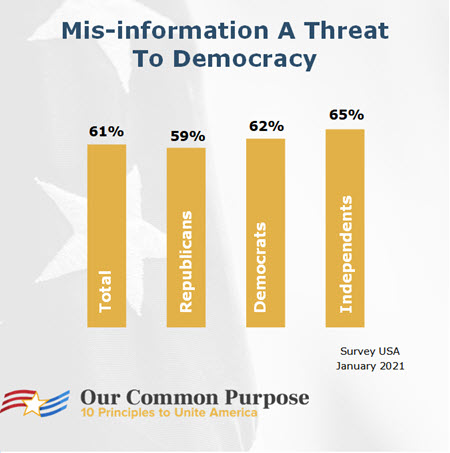 Perhaps it also shouldn’t be surprising that Republicans and Democrats seem to feel, in almost equal numbers, that it’s the other side that’s being mis-informed.
Perhaps it also shouldn’t be surprising that Republicans and Democrats seem to feel, in almost equal numbers, that it’s the other side that’s being mis-informed.
Those are the findings of the latest public opinion poll conducted for Our Common Purpose by SurveyUSA during the week between impeachment and inauguration. As with the previous polls, the survey was of 1,500 voters nationwide.
Slightly more than 6 of 10 respondents (61%) chose mis-information from a list of five partisan-related threats. The tally was nearly equally split between Biden voters (65%) and Trump voters (61%).
The result was close to the same for all age groups, ethnicities, and regions of the country. Rural voters (69%) and college grads (66%) were even a little more inclined to hit on mis-information.
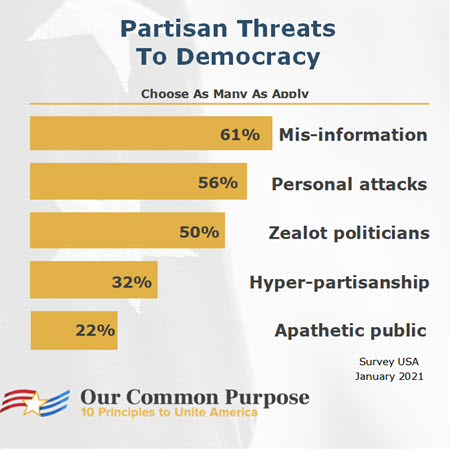 With respondents allowed to pick as many of the five choices as they thought appropriate, the next biggest threat (chosen by 56%) were “ever-worsening personal attacks” being made on each other. This was slightly more of a concern to Biden voters (60%) and women (62%) than to Trump voters (53%) and men (50%).
With respondents allowed to pick as many of the five choices as they thought appropriate, the next biggest threat (chosen by 56%) were “ever-worsening personal attacks” being made on each other. This was slightly more of a concern to Biden voters (60%) and women (62%) than to Trump voters (53%) and men (50%).
Mis-information and personal attacks were followed by “over-reaching politicians” (50%) and “hyper-partisanship” (32%). Only 22% of voters saw an “apathetic public” as a concern.
Biden’s Actions Belie The Words
Joe Biden made an impassioned plea for unity in his inaugural address, promising to put his whole soul into “bringing America together, uniting our people, and uniting our nation.”
A critically important sentiment – in poll after poll for Our Common Purpose, 80% of voters say we’re better united than divided – but actions speak louder than words. Hardly had the new president finished saying all the right things when he signed a slew of executive orders that stuck a thumb in the eye of the other side.
Biden faces competing pressures:
- He must show he can get things done. Pundits love to track what each president achieves in his first 100 days in office.
- He must placate if not reward his constituents by putting in place the policy agenda they are expecting. Backers have no qualms whatsoever about playing the “we won, you lost” card to anyone who objects to this.
- On the other hand, he did promise to be “president for all Americans. I will fight as hard for those who did not support me as for those who did. We must end this uncivil war that pits red against blue. Rural versus urban, conservative versus liberal.”
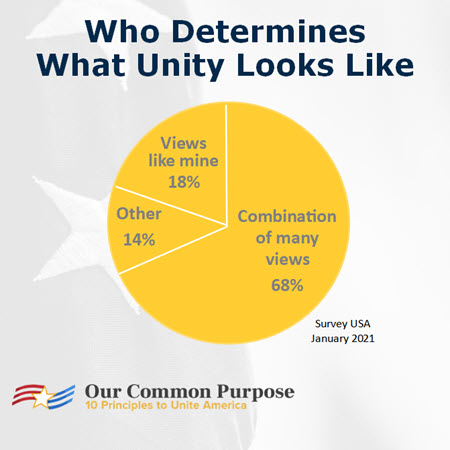 Wishful thinking won’t get this done. Unity is a difficult proposition that has to begin with at least some consultation of the opposing side.
Wishful thinking won’t get this done. Unity is a difficult proposition that has to begin with at least some consultation of the opposing side.
A majority of the public understands this. Our Common Purpose’s latest public opinion survey, conducted by SurveyUSA in the time period between impeachment and inauguration, shows 68% of voters recognize that to unify the country they need to combine their wishes with the views with others. Only 18% expect to have it entirely their way.
Biden took the latter route. He quickly introduced ambitious measures popular with Democrats and reversed policies favored by Republicans. Predictably, the policy announcements have been greeted by howls of outrage from conservatives. In that the GOP hardly has been a paragon of unity for the past four years, their hypocrisy does not go unnoticed.
Nonetheless it was Biden who made the promise. When the president says one thing in a high-visibility speech and immediately does the opposite, he has no one else to blame for the credibility gap he has created for himself.
Is it any wonder that the public is distrustful, even cynical, toward politicians?
The Good, Bad, and Ugly
The past few months have shown there might be a corollary to principle #3: Our Great Democracy Is Only As Good As We Make It. We’ve seen that it also can be as bad as we make it.
The Good
Congress did not allow itself to be cowed by the insurrection at the U.S. Capitol on January 6. Its members courageously returned to their chambers that very evening to certify the election of the new president of the United States. Our democratic traditions prevailed, barely.
The Bad
Diehard backers of the outgoing president resorted to violence and other despicable acts in storming the Capitol that day. Real damage was done. Five individuals were killed. Others, including the vice president of the United States, were threatened. Hallways and offices were desecrated. Equally smudged were the reputation of the U.S. in the world and our own image of what our country represents.
The Ugly
The latest nationwide polling for Our Common Purpose indicates that the strife of the past few months has left considerable debris that could take a good long while to dissipate. Lowlights from the survey of 1,500 voters conducted by SurveyUSA from January 14-18 (in the week between impeachment and inauguration):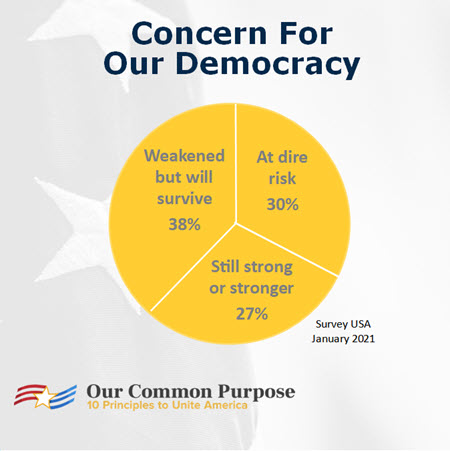
• Nearly one-half of Republicans (49%) remain convinced that fraud altered the result of the election. On the other hand, 16% saw it as a free and fair election while another 26% believe there was fraud but not enough to swing the outcome. The remaining 9% of Republicans aren’t sure.
• The strife of recent weeks hasn’t helped the cause of unity. A near majority (49%) of all voters believe it has hardened and deepened divisions. Republicans (61%) and independents (52%) are more inclined in this direction than Democrats (39%). By comparison, only 22% of all those polled believe the severity of the strife increased the willingness to address those divisions.
• The impact on our democracy is not a favorable one. A sizeable segment (30%) believes democracy is at dire risk. Another 38% believe it has been weakened but will survive. These assessments are shared fairly evenly among political affiliations.
• By comparison, few see much of any good that has come of this. A relatively small group (21%) believe democracy was tested in 2020 but remains strong. This sentiment tilts slightly more to Democrats (25%) than to Republicans (18%). Only a tiny fraction (6%) believe democracy has been strengthened.
• One positive note is the nearly non-existent support for the insurrectionists. Only 3%, including just 4% of Republicans, say they were justified in assaulting the Capitol.
Yet their actions have dangerous consequences and what could be long-lasting effects in the various ways listed above and more. We have to do better. Our Great Democracy Is Only As Good As We Make It. Unfortunately, it also can be as bad as we make it.
